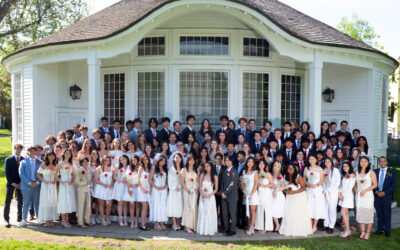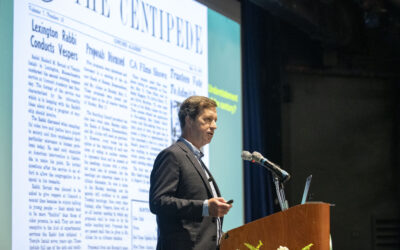Each year, Concord Academy celebrates Martin Luther King Jr. Day with a day of engagement rather than a day off. During this annual centerpiece of Community and Equity (C&E) programming, CA students and adults are accustomed to hearing from a guest speaker, perhaps viewing and discussing a film, and engaging one another in student- and faculty-led workshops. This year, CA honored Dr. King’s legacy in new ways. The program, held on January 27 on the first day of STAC 4, featured not one guest but seven, and the format was, for the first time, virtual. The day’s theme, “Infinite Hope: Imagining Black Futures,” took inspiration from a line from a 1968 address of Dr. King’s: “We must accept finite disappointment, but never lose infinite hope.” A panel discussion, several workshops, and a keynote poetry reading and Q&A asked the CA community to focus through a specific lens: imagining what a liberated future that uplifts and centers Black people, communities, and culture looks like.
“Because we had to get creative this year during the pandemic,” says Courtney Fields-Thomas, interim co-director of the C&E team, “we felt like we couldn’t run internal workshops in the same way, so we were able to do something a little different that I think enhanced the day for most people during a time when it’s hard to get that community feel.” The goal, she says, was to help students “feel connected to their community at CA, while fostering a passion for social justice that can expand beyond CA and help all of us imagine possibilities for community organizing that can build a more liberated future.”
In his introduction on January 27, Rob Munro, CA’s dean of academic program and equity, grounded the 2021 MLK Day programming in the Black philosophical tradition of quietism—the ability to endure present suffering in the knowledge that the future will be better, and that the Black community deserves better. He also read from the National Youth Poet Laureate Amanda Gorman’s inaugural poem, “The Hill We Climb,” which had reverberated profoundly from the U.S. Capitol steps just the week before.
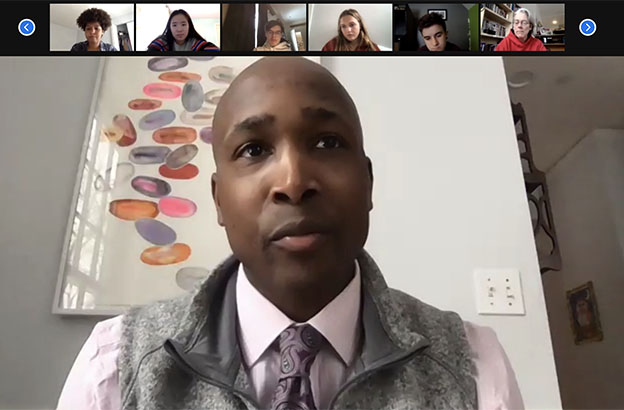
Dean of Academic Program and Equity Rob Munro frames CA’s 2021 MLK Day programming.
In her opening remarks, Interim Head of School Sarah Yeh P’24 said, “Every MLK Day at CA has sparked or challenged me to explore and embrace shifts in my perspective, my actions, my commitments, or my priorities,” and she encouraged students to look for those same opportunities as they brought different perspectives and experiences but engaged together as a community within an explicitly anti-racist framework. She also noted the opportunity that the new virtual format offered for inviting parents, alumnae/i, and extended members of CA’s community to attend the keynote poetry reading.
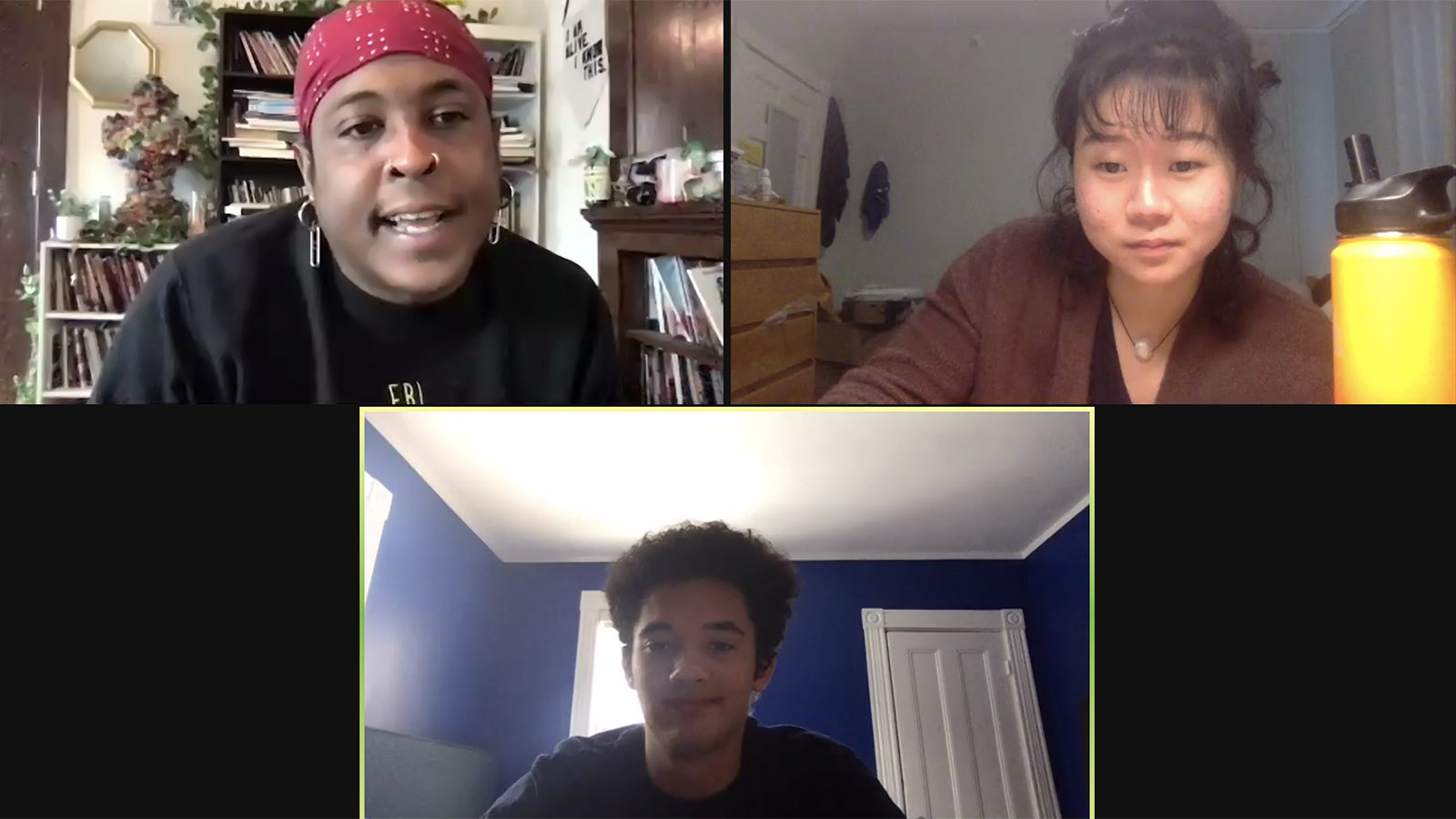
Poet Danez Smith answers questions from CA students following a poetry reading—the keynote address of CA’s 2021 MLK Day programming.
Keynote by Poet Danez Smith
Celebrated poet Danez Smith, a Black, queer, Poz writer and performer, captivated the CA community with a poetry reading, by turns blistering, heartrending, and propulsive. Smith generously spent time afterward discussing their approach to writing and revising and to using language to challenge others, as well as the human connections that give them hope—a quality Smith said can’t come without work and finds surer footing “with a side of pessimism.”
The poet made a strong impression on many in the CA community. “Danez Smith is a beautiful spoken-word poet and they really spoke to me and many of my peers,” says Meleah Neely ’21, a co-head of CA’s Women of Color Alliance (WoCA). “Especially considering the events of last year, Danez was able to mix humor and tragedy, worldly events with their own personal stories, and overall touched so many people—including myself.”
“To hear poems orated brought a power to them that turned Danez’s keynote into the highlight of the day,” says Sterling Hoyte ’22, a co-head of CA’s Men of Color Alliance (MoCA). “Smith was a fantastic guiding voice, putting the community in the proper headspace to actively participate in a day of growth. We also appreciated the extra Q&A session in which members of MoCA, WoCA, and QPOC [Queer People of Color] were able to communicate with Danez more personally.”
Speaking with that group of BIPOC students about code switching—adjusting one’s speaking style as one moves through different social contexts—Smith urged students to center their own empowerment. “Living many lives, you learn many languages,” they said. “How can you only use the languages that make you feel vibrant?”
Learn More: Read about Danez Smith and watch them perform “Dear White America” in a recent article from the Guardian.
Discussion and Workshops by BIPOC-centered Organizers
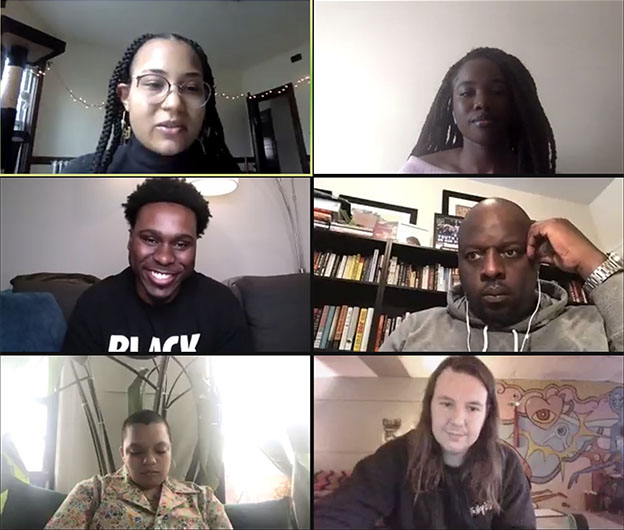
Clockwise from top left: moderator Leah Cabrera, CA math teacher and C&E team member; Kimberly Cajuste from The City School’s Social Justice Leadership Institute; Tony Clark, founder of My Brothers Keeper; Sam Potrykus from Brain Arts Organization; artist OJ Slaughter; and M. Moses Michael, co-founder of The Loop Lab take part in panel discussion during CA’s 2021 MLK Day programming.
The panel discussion, a conversation among Black, Indigenous, and People of Color (BIPOC)-centered organizations and artist-activists, took the focus “Organizing for Our Future.” Guests who participated in the panel conversation, and who also led individual workshops, included several Boston-area activists and artists. Tony Clark, a professor as well as founder and board president of My Brother’s Keeper, works to eradicate the barriers for young males of color. Sam Potrykus directs programming at Brain Arts Organization, which seeks cultural justice in Boston, and founded the Dorchester Arts Project, a community-driven art space. OJ Slaughter, a Black, queer documentarian and artist tells Black American stories and empowers others to tell their own. Social entrepreneur M. Moses Michael co-founded The Loop Lab, a BIPOC-led nonprofit specializing in media arts internship and digital storytelling. And Kimberly Cajuste, a member of The City School’s Social Justice Leadership Institute, supports youth to become effective leaders for social justice.
With candor and appreciation for multiple perspectives, these changemakers informed CA students about how they center Black liberation in their work at a time when the United States is experiencing a resurgence of white nationalism. They addressed the necessity of collaborating with and taking direction from BIPOC communities and shared the standards for accountability they hold themselves to. And they discussed methods for self-care that allow them to continue their engagement in their work.
Among workshop offerings, the film John Lewis: Good Trouble was shown, about the congressman and civil rights activist who passed away this summer. And a featured presentation brought alumna Daysha Veronica ’10, a playwright, author, viral spoken word artist, veteran digital media producer, and an MFA candidate at UCLA, back to speak again with the CA community. In her workshop, she defined unity as impossible without accountability, and accountability as requiring honesty about racism. She engaged students in a media-savvy exploration of broad American cultural expectations of patience from Black individuals in the face of racist attacks, and biased perceptions that make Black anger in response to suffering seem unnecessarily hostile. Read more about Veronica at her platform, Yes Queen.
The workshops and speaking program took place between affinity group spaces for BIPOC and international students to gather and a closing evening meditation led by Nalaverse, a Black-centered and women-owned virtual studio.

Daysha Veronica ’10 gives a presentation examining Black patience and Black anger as part of Concord Academy’s 2021 MLK Day programming.
The Role of MLK Day for the CA Community
Student members of the Men of Color Alliance (MoCA) reacted positively to “the refocusing of the day on Black voices,” says Sterling. “Many were of the opinion that in the last few years the day had become more about social justice in general rather than Dr. King, the civil rights movement, and systemic oppression against Black people in America.”
Feedback the C&E Office gathered was generally positive, with many students expressing appreciation for the day’s specific focus on racial justice and the opportunity to connect with and learn from leaders in this work in the Greater Boston area. While some missed the opportunity to develop their own workshops, others, particularly students of color who, Sterling says, can feel that “the burden of educating others” about racism can fall to students, appreciated their facilitation by professionals—and several wished they could have participated in more than one workshop.
There are as many ways to engage in anti-racist work as there are students at Concord Academy. Learning about racism and the ways it operates within the structures of society, particularly in the United States, doesn’t come as new information for many students, but CA’s devotion of the day this year specifically to Black liberation did offer a focused way for students and adults to consider their relation to the school’s work of striving for equity, both individually and collectively.
“I remembered that I have a community within my school,” Meleah says, “From Umoja [CA’s Black/African American/African Caribbean affinity group] to WoCA, I have communities in which I feel like I belong. And that is so important as we consider the isolation that COVID-19 has left us with and the fear and anxiety that comes from the new era of white supremacy that was created under an authoritarian leader. Having a community that cares for you and is there for you is something so powerful that often is overlooked.”
An extraordinary amount of preparation and care goes into this special day each year, but it is with the intention that the insights gained and connections made be carried forward in line with CA’s commitment to striving for equity. That’s important to the C&E team, and also to students.
“MLK day is just one piece of a much larger puzzle of equity,” Sterling says. “The day was helpful, but as the phrase ‘striving for equity’ suggests, equity is never something we will truly attain because it is ever-changing based on the needs of the underrepresented. We need the greater community to take with them the sentiments of MLK Day and apply them to every day of the year. Recognizing that workshops and speeches do not simply solve issues, and further channeling what one has learned into decisive action, is an important part of the bigger picture.”
CA’s observance of MLK Day took place this year on January 27—also International Holocaust Remembrance Day. Later in the evening, CA’s Jewish Student Organization (JSO) hosted an open meeting, inviting all CA students and adults for a discussion with Holocaust educator Sheira Rosenfield from Temple Beth Shalom in Needham, Mass.
